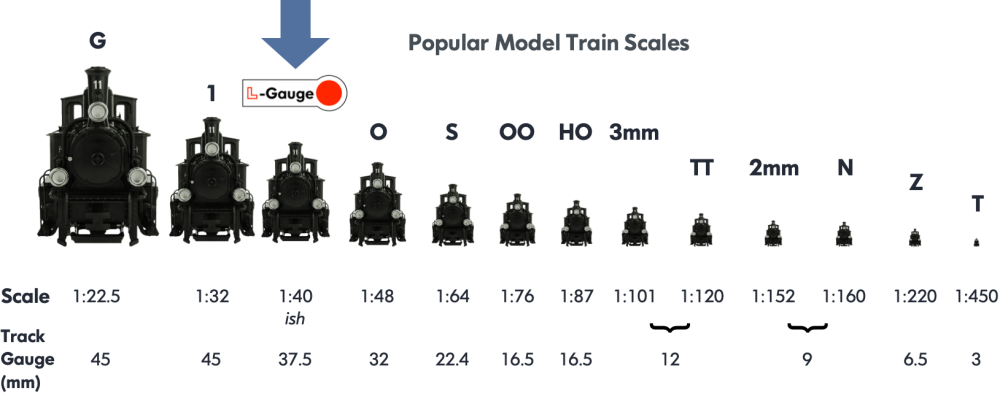Difference between revisions of "Welcome to L-Gauge"
| (17 intermediate revisions by 2 users not shown) | |||
| Line 1: | Line 1: | ||
__NOTOC__ | __NOTOC__ | ||
| + | {| | ||
| + | |http://l-gauge.org/bannerimages/banner1.jpg http://l-gauge.org/bannerimages/banner2.jpg http://l-gauge.org/bannerimages/banner3.jpg | ||
| + | |} | ||
| + | |||
L-Gauge is an information resource for the LEGO® model train community. Our goal is to help support, promote, and educate fans and hobbyists interested in learning about and building model trains and layouts from LEGO® bricks. L-Gauge is not an official standard; however, there are a few recognized conventions and practices that have evolved over time in order ease collaboration among LEGO® train fans. The information contained in this site is the result of the collective knowledge, wisdom, and best practices from LEGO® train fans from around the world. Enjoy! | L-Gauge is an information resource for the LEGO® model train community. Our goal is to help support, promote, and educate fans and hobbyists interested in learning about and building model trains and layouts from LEGO® bricks. L-Gauge is not an official standard; however, there are a few recognized conventions and practices that have evolved over time in order ease collaboration among LEGO® train fans. The information contained in this site is the result of the collective knowledge, wisdom, and best practices from LEGO® train fans from around the world. Enjoy! | ||
| + | |||
| + | |||
| + | '''What is L-Gauge?''' | ||
| + | |||
| + | L-Gauge is an unofficial term used to describe the hobby of LEGO® System trains which use the common track gauge of 37.5 mm or 40 mm centre-line gauge (5 studs). See the chart below to see how L-Gauge compares to other popular model train scales: | ||
| + | |||
| + | |||
| + | [[File:allthescales.png|1000px|link=]] | ||
| + | |||
Below you will find categories of information and resources to help you learn more about L-Gauge. | Below you will find categories of information and resources to help you learn more about L-Gauge. | ||
| Line 13: | Line 26: | ||
* [[Couplers|Couplers]] | * [[Couplers|Couplers]] | ||
| − | == Layouts == | + | == [[Layouts]] == |
| − | * [[ | + | * [[Modular Standards|Modular Standards]] |
| − | |||
* [[Tables, baseboards, benchwork|Tables]] | * [[Tables, baseboards, benchwork|Tables]] | ||
| − | == Resources == | + | == [[Resources|Resources]] == |
* [[CAD Tools|CAD Tools]] | * [[CAD Tools|CAD Tools]] | ||
| − | * [[Instructions|Instructions]] | + | * [[Reference Instructions | Instructions]] |
== Electrical == | == Electrical == | ||
Latest revision as of 19:40, 28 February 2021
  
|
L-Gauge is an information resource for the LEGO® model train community. Our goal is to help support, promote, and educate fans and hobbyists interested in learning about and building model trains and layouts from LEGO® bricks. L-Gauge is not an official standard; however, there are a few recognized conventions and practices that have evolved over time in order ease collaboration among LEGO® train fans. The information contained in this site is the result of the collective knowledge, wisdom, and best practices from LEGO® train fans from around the world. Enjoy!
What is L-Gauge?
L-Gauge is an unofficial term used to describe the hobby of LEGO® System trains which use the common track gauge of 37.5 mm or 40 mm centre-line gauge (5 studs). See the chart below to see how L-Gauge compares to other popular model train scales:

Below you will find categories of information and resources to help you learn more about L-Gauge.
L-Gauge Standard
- Track Elements and Geometry
- Reference Track Configurations
- Suggested Loading Gauge
- Wheels
- Wheelbase Geometry
- Couplers
Layouts
Resources
Electrical
Future
Media/About/PR
Links
LEGO® is a trademark of the LEGO Group of companies which does not sponsor, authorize or endorse this site and its content.